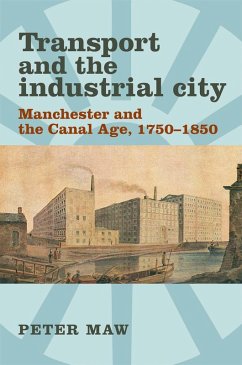This book presents the first scholarly study of the contribution of canals to Britain's industrial revolution. Although the achievements of canal engineers remain central to popular understandings of industrialisation, historians have been surprisingly reticent to analyse the full scope of the connections between canals, transport and the first industrial revolution. Focusing on Manchester, Britain's major centre of both industrial and transport innovation, it shows that canals were at the heart of the self-styled Cottonopolis. Not only did canals move the key commodities of Manchester's industrial revolution -coal, corn, and cotton - but canal banks also provided the key sites for the factories that made Manchester the 'shock city' of the early Victorian age. This book will become essential reading for historians and students interested in the industrial revolution, transport, and the unique history of Manchester, the world's first industrial city.
Dieser Download kann aus rechtlichen Gründen nur mit Rechnungsadresse in A, D ausgeliefert werden.









